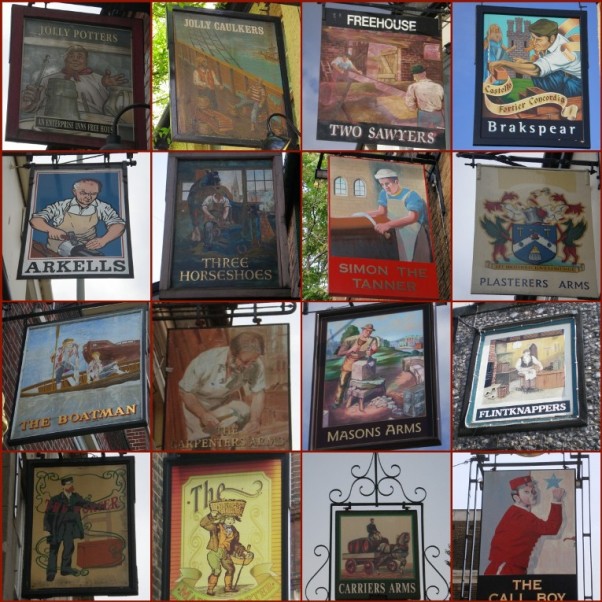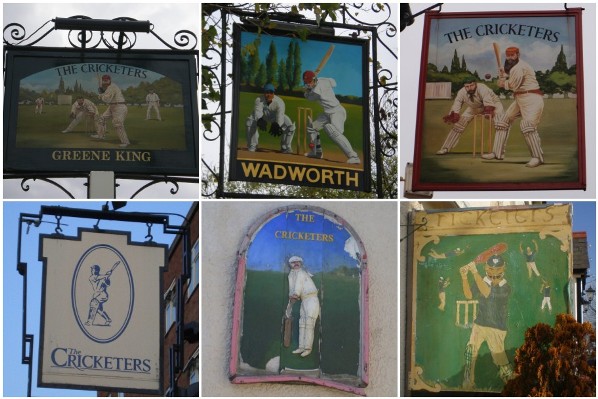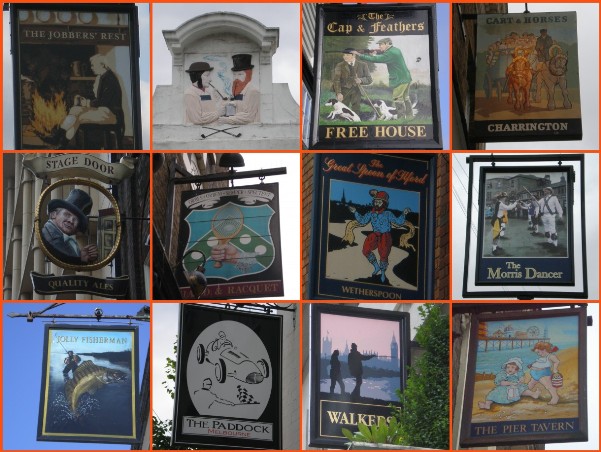by Esmerelda Weatherwax (August 2010)
There are two old adverts that stick in my mind from the days of black and white television and only one commercial channel.
One was for chocolate Mars bars, ‘A Mars a day helps you work, rest and play’ and the other for Mackesen stout. Bernard Mills would hold his glass and declare ‘Looks good, tastes good, and by Golly it does you good’.
None of which is allowed any more under various advertisers codes, healthy eating directives and safe use of alcohol initiatives. But together in my mind they make up this set of pub signs which I have called, Work, Rest and Play.
Work
From left to right and top to bottom

The Jolly Potters, Castle Donington, Leicestershire
The Jolly Caulkers and the Two Sawyers both in Chatham (noted for shipbuilding and the Royal Naval Dockyard. Hence Prime Minister Harold Wilson’s rhetorical question, “And why do I emphasise my support for the Royal Navy?” a heckler replied, “Because you’re in Chatham.”)
The Bricklayers Arms, Grays
The Whitesmith, Gloucester A whitesmith worked in lighter metal than a blacksmith, usually tin and zinc. This pub is only yards from Gloucester Docks.
The Three Horseshoes, Bradford on Avon, Wiltshire. A blacksmith at work, doing what blacksmiths are best known for.
Simon the Tanner, Long Lane, London SE1
The Plasterer’s Arms, Norwich. Sometimes these work signs show the men (rarely women) at work; sometimes, as here, a Coat of Arms. This pub was sadly closed when I passed it last year.
The Boatman, Bermonsey. One of the trades plied on the nearby River Thames
The Carpenter’s Arms, Rochester
The Mason’s Arms, Upminster
The Flintknapper, Brandon Suffolk. About a mile from the famous flint mines at Grimes Graves which supplied flint from the Stone Age through to the industrial age of the flintlock rifle. I couldn’t climb the ladder down the shaft but my husband said it was fascinating below ground.
The Porter, Bath. This particular porter is a Railway Porter.
The Market Porter, Borough, London SE1. A pub in Borough market, an ancient market selling fruit and veg which is thriving after restoration work by attracting the gourmet trade.
The Carriers Arms, East Bergholt, Stour Valley
The Call Boy, Gravesend. A modern pub built on the site of the former Grand Theatre. Some time last year the pub became Bar Liquorice and according to one of the pub websites the police closed it down, only last week.
Rest and Play
There are a few pubs noted for football, like the Hammers pub for West Ham supporters in East Ham, which I have not been near for some time, or the Boleyn at Upton Park. There was a pub in Romford called the White Hart which the owner decided to reinvent as specialising in darts and renamed the Double Top. The last time I drove past it was a hole in the ground scheduled for ‘redevelopment’. But by far the largest number of pubs featuring a game are named for the terribly English game of Cricket. Here are six of them.

Dunmow Essex, The Poplars Wingfield Wiltshire.
Cricket bats are usually made of willow so I believe the cricket pitch is in the shadow of poplar trees, as shown on the sign. Chelmsford, home of Essex County cricket Club. When I was a child Essex also played at the Leyton ground in Leyton High Road. My neighbour always told me of his watching Essex play Australia there in the 1920s. The ground is still a playing field for local schools, with a pavilion where Abu Izzadeen, or Trevor Brooks as his poor mother named him, famously told John Reid that he was not welcome in ‘a Muslim area’.
Hornchurch, where the local team was the MCC of the 18th century.
Bradwell on Sea, Essex, X2 old and new. A Victorian gentleman and a modern player in coloured ‘whites’ with face protection.
Rest (and other activities)

The Jobbers Rest Cranham. Jobbing in this sense is piece work in the woodworking trade, rather than continuous secure employment.
The Pipemaker’s Arms, Rye. Making the pipes is work, smoking them rest. Often one man’s leisure activity provides a living for another.
The Cap and Feathers Tillingham. Hunting for food as a survival skill became a sport for fun.
The Cart and Horses, Stratford. Iron Maiden started their career here, then moved down the road to East Ham and the Ruskin Arms before finding fame. A horse can pull a cart loaded with goods (see Carriers Arms above) or it can pull a charabanc full of east Londoners out on a beano to somewhere nice. Like Epping Forest or Southend on Sea.
The Stage Door, Victoria London SW opposite the Victoria Palace Theatre. To the Callboy the theatre is work, to the audience, leisure. Except for the theatre critic writing for the press.
The Hand and Racket Whitcomb Street London WC2. This pub was closed and boarded up when I passed in October and I believe it may be due for demolition. I don’t know what ball game is depicted.
The Great Spoon of Ilford. Will Kemp the original Shakespearean actor and nine days wonder danced through Ilford on his mega Morris dance from London to Norwich in January 1600.
The Morris Dancer, Harold Hill Essex. Morris dancing, so good I included it twice.
The Jolly Fisherman, Barking. Barking was a port where serious fishing took place in the days of the Small Blue fleet. This pub sign shows angling which became popular as a sport a mile downstream the Thames at Dagenham breach. Sadly the Anglers Retreat pub there was pulled down and the site, along with a lot of the nearby Ford Works is empty and was earmarked for Jack Straw’s HM Prison Beam. Whatever is eventually built there I bet a pound to a penny it won’t include a new pub.
The Paddock, Melborne Derbyshire. Less than a mile from the Castle Donington race circuit.
Walkers of St James SW1. For all London’s faults I still enjoy walking around town and along the Thames in particular. She has been my family home for at least 300 years and I won’t give up on the old lady.
The Pier Tavern, Isle of Dogs (not Docklands!!!) East Enders out on the beano also went on boat trips. This looks more like Margate to me than Southend.
To comment on this article, please click here.
If you enjoyed this piece and would like to read more by Esmerelda Weatherwax, please click here.
To help New English Review continue to publish interesting articles such as this one, please click here.
Esmerelda Weatherwax is a regular contributor to the Iconoclast, our community blog. To view her entries please click here.
- Like
- Digg
- Del
- Tumblr
- VKontakte
- Buffer
- Love This
- Odnoklassniki
- Meneame
- Blogger
- Amazon
- Yahoo Mail
- Gmail
- AOL
- Newsvine
- HackerNews
- Evernote
- MySpace
- Mail.ru
- Viadeo
- Line
- Comments
- Yummly
- SMS
- Viber
- Telegram
- Subscribe
- Skype
- Facebook Messenger
- Kakao
- LiveJournal
- Yammer
- Edgar
- Fintel
- Mix
- Instapaper
- Copy Link









